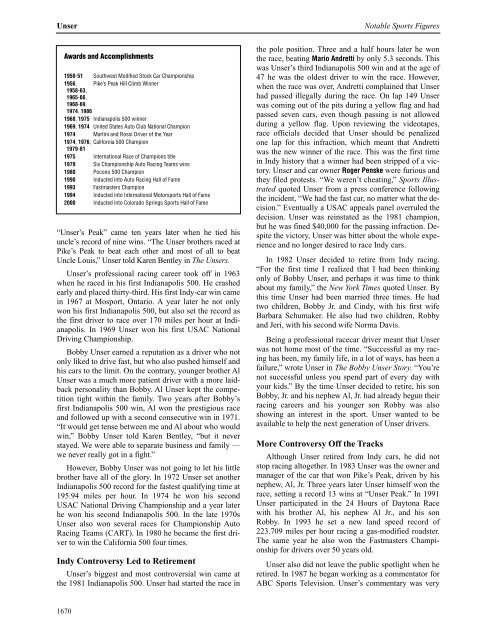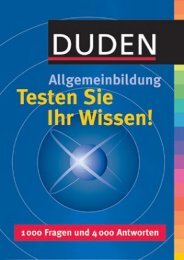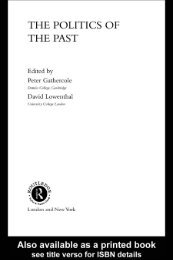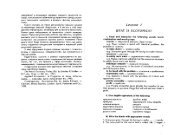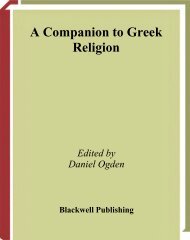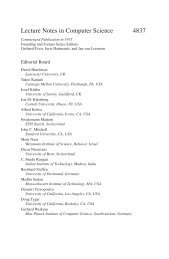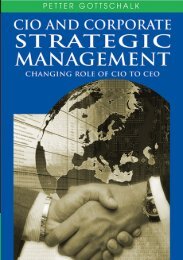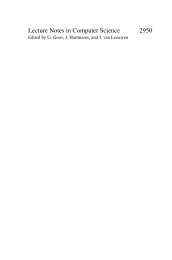Frank Thomas
Frank Thomas
Frank Thomas
Create successful ePaper yourself
Turn your PDF publications into a flip-book with our unique Google optimized e-Paper software.
Unser Notable Sports Figures<br />
Awards and Accomplishments<br />
1950-51 Southwest Modified Stock Car Championship<br />
1956, Pike’s Peak Hill Climb Winner<br />
1958-63,<br />
1965-66,<br />
1968-69,<br />
1974, 1986<br />
1968, 1975 Indianapolis 500 winner<br />
1969, 1974 United States Auto Club National Champion<br />
1974 Martini and Rossi Driver of the Year<br />
1974, 1976, California 500 Champion<br />
1979-81<br />
1975 International Race of Champions title<br />
1979 Six Championship Auto Racing Teams wins<br />
1980 Pocono 500 Champion<br />
1990 Inducted into Auto Racing Hall of Fame<br />
1993 Fastmasters Champion<br />
1994 Inducted into International Motorsports Hall of Fame<br />
2000 Inducted into Colorado Springs Sports Hall of Fame<br />
“Unser’s Peak” came ten years later when he tied his<br />
uncle’s record of nine wins. “The Unser brothers raced at<br />
Pike’s Peak to beat each other and most of all to beat<br />
Uncle Louis,” Unser told Karen Bentley in The Unsers.<br />
Unser’s professional racing career took off in 1963<br />
when he raced in his first Indianapolis 500. He crashed<br />
early and placed thirty-third. His first Indy-car win came<br />
in 1967 at Mosport, Ontario. A year later he not only<br />
won his first Indianapolis 500, but also set the record as<br />
the first driver to race over 170 miles per hour at Indianapolis.<br />
In 1969 Unser won his first USAC National<br />
Driving Championship.<br />
Bobby Unser earned a reputation as a driver who not<br />
only liked to drive fast, but who also pushed himself and<br />
his cars to the limit. On the contrary, younger brother Al<br />
Unser was a much more patient driver with a more laidback<br />
personality than Bobby. Al Unser kept the competition<br />
tight within the family. Two years after Bobby’s<br />
first Indianapolis 500 win, Al won the prestigious race<br />
and followed up with a second consecutive win in 1971.<br />
“It would get tense between me and Al about who would<br />
win,” Bobby Unser told Karen Bentley, “but it never<br />
stayed. We were able to separate business and family —<br />
we never really got in a fight.”<br />
However, Bobby Unser was not going to let his little<br />
brother have all of the glory. In 1972 Unser set another<br />
Indianapolis 500 record for the fastest qualifying time at<br />
195.94 miles per hour. In 1974 he won his second<br />
USAC National Driving Championship and a year later<br />
he won his second Indianapolis 500. In the late 1970s<br />
Unser also won several races for Championship Auto<br />
Racing Teams (CART). In 1980 he became the first driver<br />
to win the California 500 four times.<br />
Indy Controversy Led to Retirement<br />
Unser’s biggest and most controversial win came at<br />
the 1981 Indianapolis 500. Unser had started the race in<br />
1670<br />
the pole position. Three and a half hours later he won<br />
the race, beating Mario Andretti by only 5.3 seconds. This<br />
was Unser’s third Indianapolis 500 win and at the age of<br />
47 he was the oldest driver to win the race. However,<br />
when the race was over, Andretti complained that Unser<br />
had passed illegally during the race. On lap 149 Unser<br />
was coming out of the pits during a yellow flag and had<br />
passed seven cars, even though passing is not allowed<br />
during a yellow flag. Upon reviewing the videotapes,<br />
race officials decided that Unser should be penalized<br />
one lap for this infraction, which meant that Andretti<br />
was the new winner of the race. This was the first time<br />
in Indy history that a winner had been stripped of a victory.<br />
Unser and car owner Roger Penske were furious and<br />
they filed protests. “We weren’t cheating,” Sports Illustrated<br />
quoted Unser from a press conference following<br />
the incident, “We had the fast car, no matter what the decision.”<br />
Eventually a USAC appeals panel overruled the<br />
decision. Unser was reinstated as the 1981 champion,<br />
but he was fined $40,000 for the passing infraction. Despite<br />
the victory, Unser was bitter about the whole experience<br />
and no longer desired to race Indy cars.<br />
In 1982 Unser decided to retire from Indy racing.<br />
“For the first time I realized that I had been thinking<br />
only of Bobby Unser, and perhaps it was time to think<br />
about my family,” the New York Times quoted Unser. By<br />
this time Unser had been married three times. He had<br />
two children, Bobby Jr. and Cindy, with his first wife<br />
Barbara Schumaker. He also had two children, Robby<br />
and Jeri, with his second wife Norma Davis.<br />
Being a professional racecar driver meant that Unser<br />
was not home most of the time. “Successful as my racing<br />
has been, my family life, in a lot of ways, has been a<br />
failure,” wrote Unser in The Bobby Unser Story. “You’re<br />
not successful unless you spend part of every day with<br />
your kids.” By the time Unser decided to retire, his son<br />
Bobby, Jr. and his nephew Al, Jr. had already begun their<br />
racing careers and his younger son Robby was also<br />
showing an interest in the sport. Unser wanted to be<br />
available to help the next generation of Unser drivers.<br />
More Controversy Off the Tracks<br />
Although Unser retired from Indy cars, he did not<br />
stop racing altogether. In 1983 Unser was the owner and<br />
manager of the car that won Pike’s Peak, driven by his<br />
nephew, Al, Jr. Three years later Unser himself won the<br />
race, setting a record 13 wins at “Unser Peak.” In 1991<br />
Unser participated in the 24 Hours of Daytona Race<br />
with his brother Al, his nephew Al Jr., and his son<br />
Robby. In 1993 he set a new land speed record of<br />
223.709 miles per hour racing a gas-modified roadster.<br />
The same year he also won the Fastmasters Championship<br />
for drivers over 50 years old.<br />
Unser also did not leave the public spotlight when he<br />
retired. In 1987 he began working as a commentator for<br />
ABC Sports Television. Unser’s commentary was very


